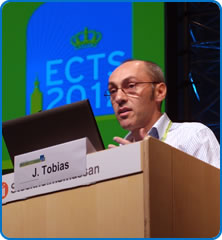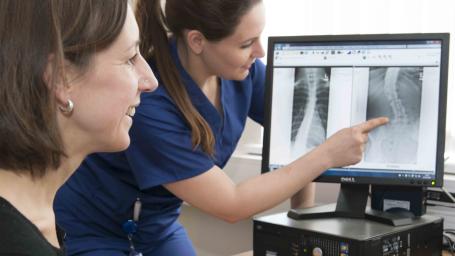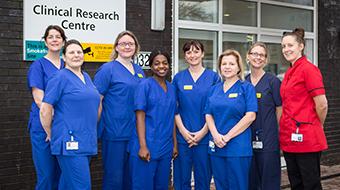The Women and Children’s Research Unit conducts research that aims to improve the care of women and children using Obstetrics and Gynaecology services. This includes pre-conception services though to postnatal care.
The Unit collaborates widely with other disciplines and professions, as well as with women and their companions, to develop ground-breaking research and care, for our patients and throughout the NHS.
Here Dr Dimitrios Siassakos, Consultant Senior Lecturer in Obstetrics, and Christy Burden, Senior Lecturer in Obsetrics, share more about the cutting-edge research being conducted by the team:
Video Transcript:
My name is Dimitrios Siassakos, I'm a Consultant Senior Lecturer in Obstetrics, and my name is Christy Burden. I'm a Senior Lecturer in Obstetrics.
Dimitrios: So, with our team, we are leading a large and very comprehensive portfolio of studies, so a large number of studies to improve the outcome of pregnancy so that we can have healthy mothers and healthy babies as well, both from a physical and a psychological point of view.
So for example, we investigated a lot – the management and outcome of women who have bleeding around the time of birth. First of all, can we prevent women from bleeding around the time of birth with the IMOX study, which is one of the largest studies ever to be performed on the topic.
We have completed some studies to see if we can improve communication and teamwork when women do have some bleeding, and soon, with funding from the National Institute of Health Research, we are about to start the COPE study to see what is the best treatment for women who have experienced bleeding around the time of birth.
Another part of our research is focusing on women who have a bad pregnancy outcome, and how we can improve care for them afterwards. So for example, with the insight study with the Lancet stillbirth series, we investigated how to improve care for these women, and now we’re about to start the number of studies to see what are the basic principles so that women can get good care after a bad pregnancy outcome globally, so not just in the UK.
Now within that portfolio of studies, were also investigating how to improve parental involvement, and Christy has some more details.
Christy: So I've been leading on the stearic of the PARENT study, which has been looking at parental involvement in the review process after the death of a baby. And the PARENT study has been looking at developing the process, and then implementing the process, here at North Bristol and also in Manchester.
So the aim of the study is to improve the review process that happens after a baby dies, and this really aligns with the government targets at the moment to try and reduce the number of stillbirths by 50% by 2025. So our research has been really front-leading in this area.
Other research that I've been very much involved in, and we're driving now North Bristol, has been managing women with high-risk pregnancies and maternal medicine complications. And one is that that this is looking at a cute kidney injury in pregnancy.
So this is known to be a real problem outside pregnancy, but in pregnancy we're seeing an increasing problem with acute kidney injury, due to our more complex population, but we don't know how to define this well. So a study that we starting in the summer will be looking at how to define this and looking at you what the incidence is.
Dimitrios: Christy, how do you think all the maternal medicine research fits in with our portfolio?
Christy: I think we've always looked at how to manage women who have complex medical problems and high-risk pregnancies and adverse pregnancy outcomes, so I think it fits in perfectly with what we're trying to do and trying to expand and improve our care for all women. Because, you know, lots of women are having more complex problems in pregnancy now and this will be a problem in the future.






 GMC Number: 2922964
GMC Number: 2922964 The 105-year-old hospital has had a complete refurbishment and offers modern and fully accessible facilities from which the NHS will deliver a wider range of services, closer to people’s homes.
The 105-year-old hospital has had a complete refurbishment and offers modern and fully accessible facilities from which the NHS will deliver a wider range of services, closer to people’s homes. 
